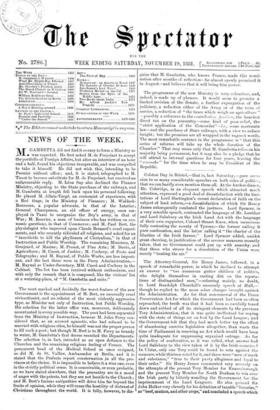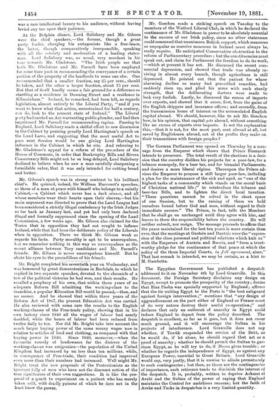The Attorney-General, Sir Henry James, followed, in a speech of
remarkable power, in which he declined to attempt an answer to "too numerous gutter children of politics, who delight themselves in casting dirt on the reputa- tions of distinguished men,"—referring mainly, no doubt, to Lord Randolph Churchill's unseemly speech at Hull,— though he replied to the more sober charges brought against the Administration. As for that non-renewal of the Peace Preservation Act for which the Government had been so often reproached, the truth was that it had been so carefully toned down and robbed of all its stringent elements by the previous Tory Administration, that it was quite ineffectual for coping with the state of things set on foot by the Land League ; and the Government felt that they had much better try the effect of abandoning coercive legislation altogether, than waste the time of Parliament in renewing an Act which would have been quite inadequate for suppressing organised outrage. As for the policy of confiscation, as it was called, what answer had Lord Salisbury to the view taken of it by the Irish counties ? In Ulster, only one Tory could be found to vote against the measure, while thirteen voted for it, and these were "men of mark and substance," "true to their party allegiance and loyal to their order." Sir Henry James commented very severely on the attempts of the present Tory Member for Knaresborough and the present Tory Member for North Durham to win over the Irish party by bitterly assailing the Government for the imprisonment of the Land Leaguers. He also quizzed Sir John Holker very cleverly for his definition of taxable " luxuries," aa " beef, mutton, and other crops," and concluded a speech which
was a rare intellectual luxury to his audience, without having levied any tax upon their patience.







































 Previous page
Previous page